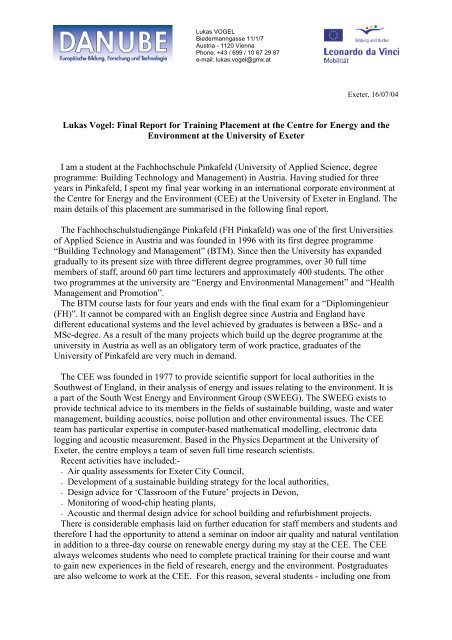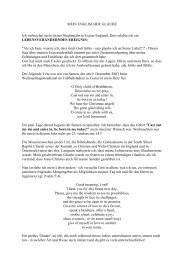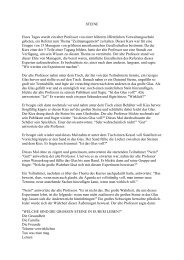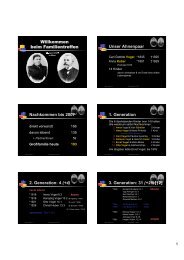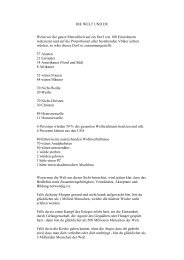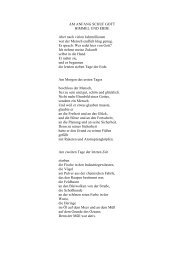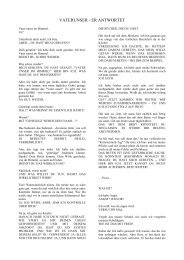Lukas Vogel: Final Report for Training Placement at the Centre for ...
Lukas Vogel: Final Report for Training Placement at the Centre for ...
Lukas Vogel: Final Report for Training Placement at the Centre for ...
You also want an ePaper? Increase the reach of your titles
YUMPU automatically turns print PDFs into web optimized ePapers that Google loves.
<strong>Lukas</strong> VOGEL<br />
Biedermanngasse 11/1/7<br />
Austria - 1120 Vienna<br />
Phone: +43 / 699 / 10 67 29 87<br />
e-mail: lukas.vogel@gmx.<strong>at</strong><br />
Exeter, 16/07/04<br />
<strong>Lukas</strong> <strong>Vogel</strong>: <strong>Final</strong> <strong>Report</strong> <strong>for</strong> <strong>Training</strong> <strong>Placement</strong> <strong>at</strong> <strong>the</strong> <strong>Centre</strong> <strong>for</strong> Energy and <strong>the</strong><br />
Environment <strong>at</strong> <strong>the</strong> University of Exeter<br />
I am a student <strong>at</strong> <strong>the</strong> Fachhochschule Pinkafeld (University of Applied Science, degree<br />
programme: Building Technology and Management) in Austria. Having studied <strong>for</strong> three<br />
years in Pinkafeld, I spent my final year working in an intern<strong>at</strong>ional corpor<strong>at</strong>e environment <strong>at</strong><br />
<strong>the</strong> <strong>Centre</strong> <strong>for</strong> Energy and <strong>the</strong> Environment (CEE) <strong>at</strong> <strong>the</strong> University of Exeter in England. The<br />
main details of this placement are summarised in <strong>the</strong> following final report.<br />
The Fachhochschulstudiengänge Pinkafeld (FH Pinkafeld) was one of <strong>the</strong> first Universities<br />
of Applied Science in Austria and was founded in 1996 with its first degree programme<br />
“Building Technology and Management” (BTM). Since <strong>the</strong>n <strong>the</strong> University has expanded<br />
gradually to its present size with three different degree programmes, over 30 full time<br />
members of staff, around 60 part time lecturers and approxim<strong>at</strong>ely 400 students. The o<strong>the</strong>r<br />
two programmes <strong>at</strong> <strong>the</strong> university are “Energy and Environmental Management” and “Health<br />
Management and Promotion”.<br />
The BTM course lasts <strong>for</strong> four years and ends with <strong>the</strong> final exam <strong>for</strong> a “Diplomingenieur<br />
(FH)”. It cannot be compared with an English degree since Austria and England have<br />
different educ<strong>at</strong>ional systems and <strong>the</strong> level achieved by gradu<strong>at</strong>es is between a BSc- and a<br />
MSc-degree. As a result of <strong>the</strong> many projects which build up <strong>the</strong> degree programme <strong>at</strong> <strong>the</strong><br />
university in Austria as well as an oblig<strong>at</strong>ory term of work practice, gradu<strong>at</strong>es of <strong>the</strong><br />
University of Pinkafeld are very much in demand.<br />
The CEE was founded in 1977 to provide scientific support <strong>for</strong> local authorities in <strong>the</strong><br />
Southwest of England, in <strong>the</strong>ir analysis of energy and issues rel<strong>at</strong>ing to <strong>the</strong> environment. It is<br />
a part of <strong>the</strong> South West Energy and Environment Group (SWEEG). The SWEEG exists to<br />
provide technical advice to its members in <strong>the</strong> fields of sustainable building, waste and w<strong>at</strong>er<br />
management, building acoustics, noise pollution and o<strong>the</strong>r environmental issues. The CEE<br />
team has particular expertise in computer-based m<strong>at</strong>hem<strong>at</strong>ical modelling, electronic d<strong>at</strong>a<br />
logging and acoustic measurement. Based in <strong>the</strong> Physics Department <strong>at</strong> <strong>the</strong> University of<br />
Exeter, <strong>the</strong> centre employs a team of seven full time research scientists.<br />
Recent activities have included:-<br />
- Air quality assessments <strong>for</strong> Exeter City Council,<br />
- Development of a sustainable building str<strong>at</strong>egy <strong>for</strong> <strong>the</strong> local authorities,<br />
- Design advice <strong>for</strong> ‘Classroom of <strong>the</strong> Future’ projects in Devon,<br />
- Monitoring of wood-chip he<strong>at</strong>ing plants,<br />
- Acoustic and <strong>the</strong>rmal design advice <strong>for</strong> school building and refurbishment projects.<br />
There is considerable emphasis laid on fur<strong>the</strong>r educ<strong>at</strong>ion <strong>for</strong> staff members and students and<br />
<strong>the</strong>re<strong>for</strong>e I had <strong>the</strong> opportunity to <strong>at</strong>tend a seminar on indoor air quality and n<strong>at</strong>ural ventil<strong>at</strong>ion<br />
in addition to a three-day course on renewable energy during my stay <strong>at</strong> <strong>the</strong> CEE. The CEE<br />
always welcomes students who need to complete practical training <strong>for</strong> <strong>the</strong>ir course and want<br />
to gain new experiences in <strong>the</strong> field of research, energy and <strong>the</strong> environment. Postgradu<strong>at</strong>es<br />
are also welcome to work <strong>at</strong> <strong>the</strong> CEE. For this reason, several students - including one from
<strong>Lukas</strong> VOGEL<br />
Biedermanngasse 11/1/7<br />
Austria - 1120 Vienna<br />
Phone: +43 / 699 / 10 67 29 87<br />
e-mail: lukas.vogel@gmx.<strong>at</strong><br />
<strong>the</strong> FH Pinkafeld - have already been working <strong>for</strong> some weeks or months <strong>at</strong> <strong>the</strong> University of<br />
Exeter.<br />
During <strong>the</strong> last eleven months, I have worked on different projects all rel<strong>at</strong>ed to energy and<br />
<strong>the</strong> environment, particularly on energy use in buildings. Some o<strong>the</strong>r projects concerned <strong>the</strong><br />
improvements in <strong>the</strong> acoustic environment of schools. Described below are a few projects<br />
recently undertaken by <strong>the</strong> CEE.<br />
The ‘Classrooms of <strong>the</strong> Future’ initi<strong>at</strong>ive aimed <strong>at</strong> challenging current thinking on school<br />
building design. The CEE was involved in <strong>the</strong> technical planning of one classroom and is now<br />
responsible <strong>for</strong> <strong>the</strong> monitoring and evalu<strong>at</strong>ion of some of <strong>the</strong> classrooms.<br />
The project ‘Utilising Renewable Energy Schemes to achieve more Sustainable Buildings’<br />
aimed to assess small renewable energy schemes applicable to individual buildings or<br />
complexes, which concentr<strong>at</strong>ed specifically on designs available in <strong>the</strong> United Kingdom.<br />
Enquiries had been made into <strong>the</strong> availability, costs and estim<strong>at</strong>ed periods of payback <strong>for</strong> <strong>the</strong><br />
different systems, as well as into <strong>the</strong> possibility of acquiring government grants <strong>for</strong> certain<br />
systems.<br />
‘Solar He<strong>at</strong> Gains and Daylight Factors – An Analysis of Effective Shading Techniques’<br />
was ano<strong>the</strong>r project recently undertaken by <strong>the</strong> CEE. A computer program was written to<br />
assist in <strong>the</strong> calcul<strong>at</strong>ion of solar he<strong>at</strong> gains and daylight factors <strong>for</strong> window openings in<br />
buildings. This project was part of my diploma <strong>the</strong>sis, which is to be finished this summer.<br />
‘Acoustic Calcul<strong>at</strong>ions according to BB93’: New guidelines on acoustics in educ<strong>at</strong>ional<br />
buildings were published during <strong>the</strong> last year, which is why <strong>the</strong> acoustic software - developed<br />
and written by <strong>the</strong> CEE to make calcul<strong>at</strong>ions easier and quicker - had to be adapted.<br />
In addition to <strong>the</strong> projects mentioned above, a considerable number of smaller projects have<br />
been handled during <strong>the</strong> last year. Amongst o<strong>the</strong>r things, <strong>the</strong>se jobs rel<strong>at</strong>ed to <strong>the</strong> topics of ‘air<br />
quality’ and ‘wood he<strong>at</strong>ing’.<br />
My main responsibilities within <strong>the</strong>se projects were <strong>for</strong> research, calcul<strong>at</strong>ions,<br />
programming, and report writing. The wide-ranging basic educ<strong>at</strong>ion in <strong>the</strong> field of building<br />
technology and management <strong>at</strong> <strong>the</strong> FH Pinkafeld was <strong>the</strong> most useful part applicable to <strong>the</strong><br />
work during <strong>the</strong> period of practical training. This acquired knowledge was relevant <strong>for</strong> all<br />
projects which have been dealt with during <strong>the</strong> last few months. This basic educ<strong>at</strong>ion also<br />
provided instruction on how to make technical consider<strong>at</strong>ions, which was necessary to work<br />
in an institution like <strong>the</strong> CEE.<br />
As part of my prepar<strong>at</strong>ions <strong>for</strong> <strong>the</strong> year abroad, I consulted <strong>the</strong> staff via e-mail about <strong>the</strong>ir<br />
jobs, <strong>the</strong> CEE and <strong>the</strong> University of Exeter. Beyond th<strong>at</strong>, I asked <strong>the</strong> o<strong>the</strong>r Austrian student,<br />
who had already worked <strong>at</strong> <strong>the</strong> CEE, about his experiences and I used <strong>the</strong> Internet to research<br />
<strong>the</strong> University, Exeter and Devon fur<strong>the</strong>r.<br />
The English seminars <strong>at</strong> FH Pinkafeld which I had <strong>at</strong>tended be<strong>for</strong>e I went to Exeter helped<br />
to improve both written and spoken English and made it possible to work in England <strong>for</strong> <strong>the</strong><br />
period of practical training. Due to some exams in mid July last summer, I wasn’t able to<br />
<strong>at</strong>tend an extra English course as part of my prepar<strong>at</strong>ions be<strong>for</strong>e departure. This course would<br />
have helped me to increase confidence in my language capabilities in <strong>the</strong> first few weeks of<br />
my stay abroad. During <strong>the</strong> course of my stay in Exeter, I have <strong>at</strong>tended a free English course<br />
<strong>at</strong> <strong>the</strong> University of Exeter which was offered to <strong>for</strong>eign students. This helped me to improve<br />
my English grammar, which had a knock-on effect on <strong>the</strong> quality of my report writing.
<strong>Lukas</strong> VOGEL<br />
Biedermanngasse 11/1/7<br />
Austria - 1120 Vienna<br />
Phone: +43 / 699 / 10 67 29 87<br />
e-mail: lukas.vogel@gmx.<strong>at</strong><br />
The opportunity to work facilit<strong>at</strong>ed <strong>the</strong> use and applic<strong>at</strong>ion of <strong>the</strong> specialist knowledge I had<br />
acquired during my studies <strong>at</strong> <strong>the</strong> FH Pinkafeld. It allowed me to gain an insight into <strong>the</strong> field<br />
of research, technological development and applied building technology and management,<br />
and raised self-confidence. I have acquired new knowledge of st<strong>at</strong>e-of-<strong>the</strong>-art technologies in<br />
<strong>the</strong> renewable energy sector and have increased my general understanding in this area, which<br />
will benefit me in <strong>the</strong> future. Working in a group which was small, friendly and supportive<br />
helped me to improve my team skills. This year has also raised my employability. The<br />
improved language skills - especially new words and phrases but also grammar and<br />
confidence - will help me to acquire a job in an intern<strong>at</strong>ional corpor<strong>at</strong>e environment.<br />
As mentioned above, this placement was part of my studies <strong>at</strong> <strong>the</strong> FH Pinkafeld. The<br />
University in Austria and <strong>the</strong> CEE helped me to gain as many new experiences as possible. I<br />
have also started work on my diploma <strong>the</strong>sis, which I must submit this summer. My<br />
supervisor in Exeter as well as my professor in Pinkafeld have supported me in every possible<br />
way to make <strong>the</strong> most out of my stay abroad. Beyond th<strong>at</strong>, I will receive a letter confirming<br />
my work placement, which may be beneficial when looking <strong>for</strong> a job in <strong>the</strong> future.<br />
The practical training made it possible to increase my professional responsibility, linguistic<br />
competence, to gain an insight into <strong>the</strong> field of research and technological development and to<br />
use and apply <strong>the</strong> specialized knowledge, which I had acquired throughout my studies <strong>at</strong> <strong>the</strong><br />
FH Pinkafeld. It was indeed useful to learn more about various applic<strong>at</strong>ions of ‘Building<br />
Technology and Management’.<br />
On a personal level, <strong>the</strong> responsibilities <strong>for</strong> <strong>the</strong> success of different projects built up my selfconfidence<br />
in <strong>the</strong>se disciplines. The experience gained whilst working as a student<br />
represent<strong>at</strong>ive in Austria made it more easy to cope with <strong>the</strong>se responsibilities.<br />
I have learnt a lot about <strong>the</strong> English culture, have improved my language skills and have<br />
also made new friends outside of work.<br />
I have not faced any major problems whilst working in England and <strong>the</strong> minor ones were<br />
solved easily. The Leonardo da Vinci II Programme was on <strong>the</strong> whole well organized. My<br />
only suggestion <strong>for</strong> improvement would concern <strong>the</strong> applic<strong>at</strong>ion process, which was altered in<br />
last summer. There<strong>for</strong>e I had to apply <strong>for</strong> a second time and I had not received <strong>the</strong> letter<br />
confirming funding from <strong>the</strong> Leonardo scheme be<strong>for</strong>e my departure. Such uncertainty was<br />
r<strong>at</strong>her stressful and represented a neg<strong>at</strong>ive factor of my prepar<strong>at</strong>ions <strong>for</strong> <strong>the</strong> year abroad. The<br />
l<strong>at</strong>e notice (and <strong>the</strong>re<strong>for</strong>e l<strong>at</strong>e first payment) also had consequences <strong>for</strong> my financial situ<strong>at</strong>ion<br />
in <strong>the</strong> weeks which followed, meaning I had to borrow some money from friends.<br />
I want to take this opportunity to thank everyone who supported me throughout my<br />
prepar<strong>at</strong>ions <strong>for</strong> <strong>the</strong> year abroad and during <strong>the</strong> year itself. It wouldn’t have been possible <strong>for</strong><br />
me to experience a year <strong>at</strong> <strong>the</strong> CEE without <strong>the</strong> funding from <strong>the</strong> Leonardo da Vinci scheme<br />
and <strong>the</strong> support of my family, friends, colleagues, supervisors and <strong>the</strong> o<strong>the</strong>rs responsible <strong>at</strong><br />
each of <strong>the</strong> Universities.


